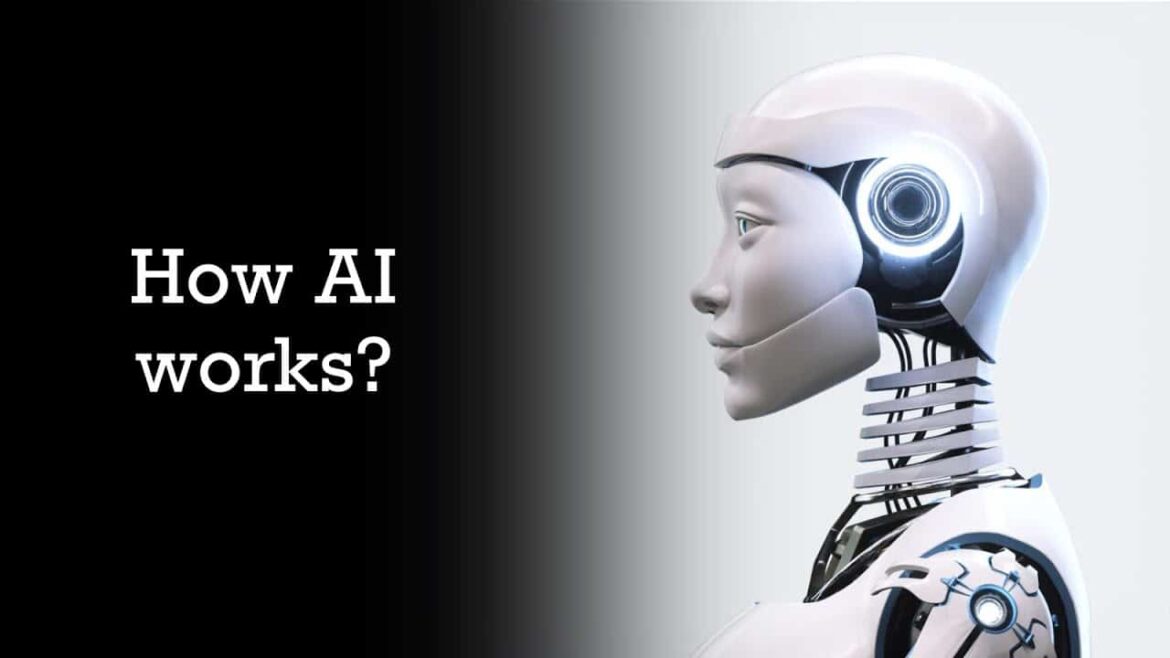How does AI actually work in detail? We take you on an exciting journey behind the scenes to shed light on the functioning, technologies, and applications of AI.
AI in practice: How does artificial intelligence work in everyday life?
In today’s digital age, artificial intelligence (AI) is everywhere. Whether in your smartphone, online shopping, or autonomous vehicles, AI is revolutionizing how we live and work. But what is behind this advanced technology? Below, we take a detailed look at how AI works to understand how it affects our lives.
- AI is based on the processing of large amounts of data by algorithms that can recognize patterns and learn from them. These algorithms are programmed to improve themselves independently without the need for human intervention. This is known as machine learning, which is a subcategory of AI.
- An essential aspect of AI is natural language processing (NLP), which enables machines to understand and process human language. This ability is essential for virtual assistants such as Siri or Alexa, which can interpret and respond to voice commands.
- Another important field is image and pattern recognition, where AI technologies are used to analyze visual information. This ability plays a crucial role in areas such as medical diagnostics or security surveillance, where precise recognition and analysis are required.
- Neural networks, inspired by the structure of the human brain, are a key technology in AI. These networks consist of layers of neurons that are interconnected and process information. They are particularly effective at complex tasks such as image recognition or language translation.
- artificial intelligence, android, ai, artificial intelligences, ki, androids *** artificial intelligence, android, ai, artificial intelligences, cyborg g54-kyg
Drivers of AI: Technologies that advance artificial intelligence
Advances in the development of AI systems depend heavily on the technologies used. Various components and approaches contribute to making AI systems more powerful and efficient. Let’s take a look at some of the core technologies that drive AI.
- Machine learning (ML) is a core AI technology that enables systems to learn from data and make predictions. ML models are trained to recognize patterns in data and make informed decisions without being explicitly programmed.
- Deep learning is a specialized form of machine learning based on deep neural networks. These networks are particularly effective at processing unstructured data, such as images or audio data, and have made great strides in speech and image recognition.
- Cognitive computing aims to mimic human thought processes. It combines AI, machine learning, and other techniques to develop systems that are capable of solving complex problems and making decisions based on contextual and experiential knowledge.
- Robotics Process Automation (RPA) uses AI technologies to automate repetitive tasks in business processes. RPA applications are capable of mimicking human interactions with software, thereby increasing efficiency and accuracy across various industries.
Challenges of AI: Ethical Issues and Solutions
While AI has made impressive strides, there are also challenges and ethical issues that must be considered. The integration of AI into our society brings with it various aspects that should be carefully considered.
- One of the biggest ethical concerns with AI is the issue of privacy. Since AI systems process large amounts of personal data, there is a risk of data breaches. Strict regulations and transparent practices are necessary to ensure user safety and trust.
- The introduction of AI into work processes can lead to the automation of many tasks, which in turn can have an impact on the labor market. There is concern that many workers could be replaced by AI. It is therefore important to develop retraining and further education strategies to meet these challenges.
- Bias and discrimination are other critical issues in AI development. If training data is biased, AI systems can make discriminatory decisions. Developers must ensure that their algorithms are fair and neutral to avoid such problems.
- Transparency and explainability of AI models are crucial to gaining public trust. It is important that the decisions made by AI systems are comprehensible, especially in sensitive areas such as healthcare or the justice system, in order to avoid misunderstandings and wrong decisions.
Successful AI deployment: industries where artificial intelligence excels
The applications of AI are diverse and offer numerous benefits for various industries. From medicine to entertainment, AI is changing the way companies operate and deliver services.
- In healthcare, AI assists doctors in diagnosing and treating diseases. By analyzing large amounts of data, AI-powered systems can make accurate predictions and develop personalized treatment plans that improve patient care.
- In the financial sector, AI helps with fraud detection, risk assessment, and automated customer service. AI systems can monitor transaction patterns, identify suspicious activity, and make quick decisions to minimize potential risks.
- In retail, AI solutions optimize the shopping experience by providing personalized recommendations and automating inventory management. With AI, companies can analyze customer data to create tailored offers and increase customer satisfaction.
- In the automotive industry, AI is driving the development of autonomous vehicles. These vehicles use AI to respond to traffic conditions in real time and provide safer driving experiences. AI also improves production processes through intelligent automation and quality control.

